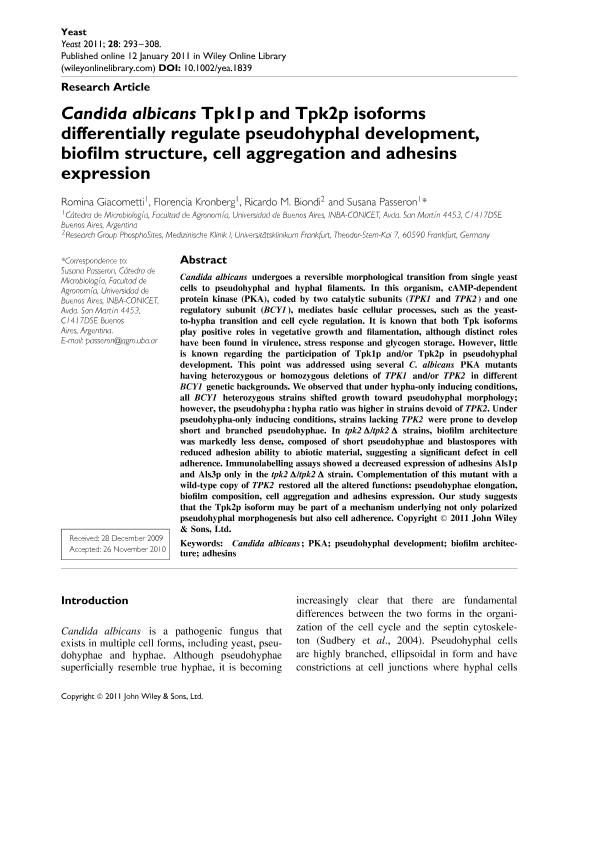Artículo
Candida albicans Tpk1p and Tpk2p isoforms differentially regulate pseudohyphal development, biofilm structure, cell aggregation and adhesins expression
Fecha de publicación:
04/2011
Editorial:
John Wiley & Sons Ltd
Revista:
Yeast
ISSN:
0749-503X
Idioma:
Inglés
Tipo de recurso:
Artículo publicado
Clasificación temática:
Resumen
Candida albicans undergoes a reversible morphological transition from single yeast cells to pseudohyphal and hyphal filaments. In this organism, cAMP-dependent protein kinase (PKA), coded by two catalytic subunits (TPK1 and TPK2) and one regulatory subunit (BCY1), mediates basic cellular processes, such as the yeast-to-hypha transition and cell cycle regulation. It is known that both Tpk isoforms play positive roles in vegetative growth and filamentation, although distinct roles have been found in virulence, stress response and glycogen storage. However, little is known regarding the participation of Tpk1p and/or Tpk2p in pseudohyphal development. This point was addressed using several C. albicans PKA mutants having heterozygous or homozygous deletions of TPK1 and/or TPK2 in different BCY1 genetic backgrounds. We observed that under hypha-only inducing conditions, all BCY1 heterozygous strains shifted growth toward pseudohyphal morphology; however, the pseudohypha:hypha ratio was higher in strains devoid of TPK2. Under pseudohypha-only inducing conditions, strains lacking TPK2 were prone to develop short and branched pseudohyphae. In tpk2Δ/tpk2Δ strains, biofilm architecture was markedly less dense, composed of short pseudohyphae and blastospores with reduced adhesion ability to abiotic material, suggesting a significant defect in cell adherence. Immunolabelling assays showed a decreased expression of adhesins Als1p and Als3p only in the tpk2Δ/tpk2Δ strain. Complementation of this mutant with a wild-type copy of TPK2 restored all the altered functions: pseudohyphae elongation, biofilm composition, cell aggregation and adhesins expression. Our study suggests that the Tpk2p isoform may be part of a mechanism underlying not only polarized pseudohyphal morphogenesis but also cell adherence.
Palabras clave:
Adhesins
,
Biofilm Architecture
,
Candida Albicans
,
Pka
,
Pseudohyphal Development
Archivos asociados
Licencia
Identificadores
Colecciones
Articulos(INBA)
Articulos de INST.DE INVEST. EN BIOCIENCIAS AGRICOLAS Y AMBIENTALES
Articulos de INST.DE INVEST. EN BIOCIENCIAS AGRICOLAS Y AMBIENTALES
Citación
Giacometti, Romina; Kronberg, Maria Florencia; Biondi, Ricardo Miguel; Passeron, Susana; Candida albicans Tpk1p and Tpk2p isoforms differentially regulate pseudohyphal development, biofilm structure, cell aggregation and adhesins expression; John Wiley & Sons Ltd; Yeast; 28; 4; 4-2011; 293-308
Compartir
Altmétricas




